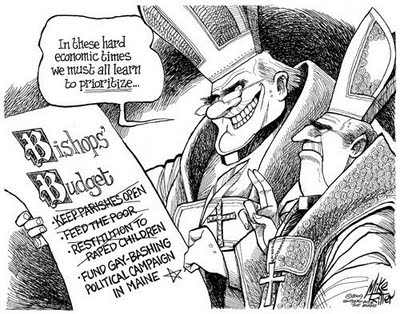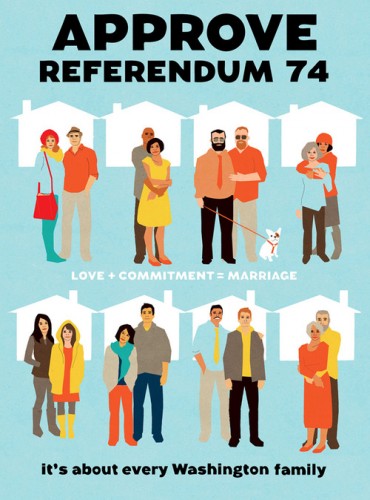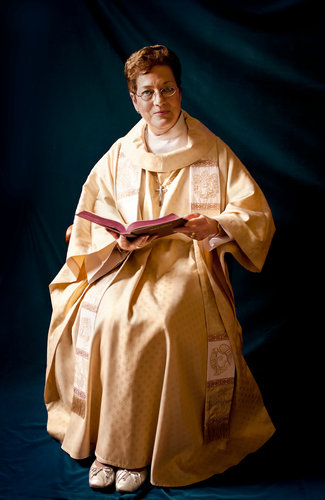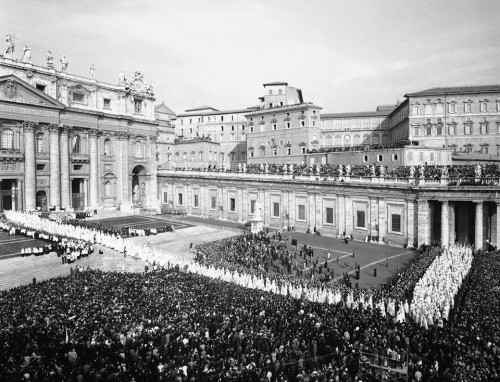Hans Küng urges confrontation from the grassroots to unseat pope and force radical reform at Vatican
One of the world’s most prominent Catholic theologians has called for a revolution from below to unseat the pope and force radical reform at the Vatican.
 Hans Küng is appealing to priests and churchgoers to confront the Catholic hierarchy, which he says is corrupt, lacking credibility and apathetic to the real concerns of the church’s members.
Hans Küng is appealing to priests and churchgoers to confront the Catholic hierarchy, which he says is corrupt, lacking credibility and apathetic to the real concerns of the church’s members.
In an exclusive interview with the Guardian, Küng, who had close contact with the pope when the two worked together as young theologians, described the church as an “authoritarian system” with parallels to Germany’s Nazi dictatorship.
“The unconditional obedience demanded of bishops who swear their allegiance to the pope when they make their holy oath is almost as extreme as that of the German generals who were forced to swear an oath of allegiance to Hitler,” he said.
The Vatican made a point of crushing any form of clerical dissent, he added. “The rules for choosing bishops are so rigid that as soon as candidates emerge who, say, stand up for the pill, or for the ordination of women, they are struck off the list.” The result was a church of “yes men”, almost all of whom unquestioningly toed the line.
“The only way for reform is from the bottom up,” said Küng, 84, who is a priest. “The priests and others in positions of responsibility need to stop being so subservient, to organise themselves and say that there are certain things that they simply will not put up with anymore.”
Küng, the author of around 30 books on Catholic theology, Christianity and ethics, which have sold millions worldwide, said that inspiration for global change was to be found in his native Switzerland and in Austria, where hundreds of Catholic priests have formed movements advocating policies that openly defy current Vatican practices. The revolts have been described as unprecedented by Vatican observers, who say they are likely to cause deep schisms in the church.
“I’ve always said that if one priest in a diocese is roused, that counts for nothing. Five will create a stir. Fifty are pretty much invincible. In Austria the figure is well over 300, possibly up to 400 priests; in Switzerland it’s about 150 who have stood up and it will increase.”
He said recent attempts by the archbishop of Vienna, Christoph Schönborn, to try to stamp out the uprising by threatening to punish those involved in the Austrian “priests’ initiative” had backfired owing to the strength of feeling. “He soon stopped when he realised that so many ordinary people are supportive of them and he was in danger of turning them all against him,” Küng said.
The initiatives support such seemingly modest demands as letting divorced and remarried people receive communion, allowing non-ordained people to lead services and allowing women to take on important positions in the hierarchy. However, as they go against conventional Catholic teaching, the demands have been flatly rejected by the Vatican.
Küng, who was stripped of the authority to teach Catholic theology by Pope John Paul II in 1979 for questioning the concept of papal infallibility, is credited with giving the present pope, Joseph Ratzinger as he then was, the first significant step up the hierarchy of Catholic academia when he called him to Tübingen University, in south-west Germany, as professor of dogmatic theology in 1966.
The pair had worked closely for four years in the 1960s as the youngest theological advisers on the second Vatican council – the most radical overhaul of the Catholic church since the middle ages. But the relationship between the two was never straightforward, with their political differences eventually driving a wedge between them. The dashing and flamboyant Hans Küng, by various accounts, often stole the limelight from the more earnest and staid Joseph Ratzinger.
Küng refers to the “heap of legends” that abound about himself and Ratzinger from their “Tübingen days”, not least the apocryphal accounts of how he gave lifts in his “red sports car” to the bicycle-riding Ratzinger.
“I often gave him a lift, particularly up the steep hills of Tübingen, yes, but too much has been made of this,” he said. “I didn’t drive a sports car, rather an Alfa Romeo Giulia. Ratzinger admitted himself that he had no interest in technology and had no driving licence. But it’s often been turned into some kind of pseudo-profound metaphor idealising the ‘cyclist’ and demonising the ‘Alfa Romeo driver’.”
Indeed the “modest” and prudent “bicycle-rider” image that pope-to-be, now 85, fostered for years has all but evaporated since his 2005 inauguration, according to Küng.
“He has developed a peculiar pomposity that doesn’t fit the man I and others knew, who once walked around in a Basque-style cap and was relatively modest. Now he’s frequently to be seen wrapped in golden splendour and swank. By his own volition he wears the crown of a 19th-century pope, and has even had the garments of the Medici pope Leo X remade for him.”
That “pomposity”, he said, manifested itself most fully in the regular audiences who gather on St Peter’s Square in Rome. “What happens has Potemkin village dimensions,” he said. “Fanatical people go there to celebrate the pope, and tell him how wonderful he is, while meanwhile at home their own parishes are in a lamentable state, with a lack of priests, a far higher number than ever before of people who are leaving than are being baptised and now Vatileaks, which indicates just what a poor state the Vatican administration is in,” he said, referring to the scandal over leaked documents uncovering power struggles within the Vatican which has seen the pope’s former butler appear in court. The trial ends on Saturday.
It was in Tübingen that the paths of the two theologians crossed for several years before diverging sharply following the student riots of 1968. Ratzinger was shocked by the events and escaped to the relative safety of his native Bavaria, where he deepened his involvement in the Catholic hierarchy. Küng stayed in Tübingen and increasingly assumed the role of the Catholic church’s enfant terrible.
“The student revolts were a primal shock for Ratzinger and after that he became ever more conservative and part of the hierarchy of the church,” said Küng.
Calling Pope Benedict XVI’s reign a “pontificate of missed opportunities”, in which he had forgone chances to reconcile with the Protestant, Jewish, orthodox and Muslim faiths, as well as failing to help the African fight against Aids by not allowing the use of birth control, Küng said his “gravest scandal” was the way he had “covered up” worldwide cases of sexual crimes committed by clerics during his time as the head of the Roman Congregation for the Doctrine of the Faith as Cardinal Ratzinger.
“The Vatican is no different from the Kremlin,” Küng said. “Just as Putin as a secret service agent became the head of Russia, so Ratzinger, as head of the Catholic church’s secret services, became head of the Vatican. He has never apologised for the fact that many cases of abuse were sealed under the secretum pontificium (papal secrecy), or acknowledged that this is a disaster for the Catholic church.” Küng described a process of “Putinisation” that has taken place at the Vatican.
Yet despite their differences, the two have remained in contact. Küng visited the pope at his summer retreat, Castel Gandolfo, in 2005, during which the two held an intensive four-hour discussion.
“It felt like we were on an equal footing – after all, we’d been colleagues for years. We walked through the park and there were times I thought he might turn the corner on certain issues, but it never happened. Since then we’ve still kept exchanging letters, but we’ve not met.”
Kung has travelled widely in his life, befriending everyone from Iranian leaders to John F. Kennedy, and Tony Blair with whom he forged close links a decade ago, becoming something of a spiritual guru for the then British prime minister ahead of his decision to convert to Catholicism.
“I was impressed how he tackled the Northern Ireland conflict. But then came the Iraq war and I was extremely troubled by the way in which he collaborated with Bush. I wrote to him calling it a historical failure of the first order. He wrote me a hand-written note in reply, saying he respected my views and thankyou, but that I should know he was acting according to his conscience and was not trying to please the Americans. I was astounded that a British prime minister could make such a catastrophic mistake, and he remains for me a tragic figure.” He described Blair’s conversion to Catholicism as a mistake, insisting he should instead have used his role as a public figure to reconcile differences between the Anglican and Catholic churches in the UK.
From his book-filled study, where a portrait of Sir Thomas More, the 16th-century English Catholic martyr, hangs on the wall, Küng looks out on to his front garden and a two-metre-tall statue of himself. Critics have called it symptomatic of Kung’s inflated sense of his own importance. He is embarrassed as he attempts to explain how it was a gift from his 20-year-old Stiftung Weltethos, (Foundation for a Global Ethic), which operates from his house and will continue to do so after his death.
Far from putting the brakes on his prolific theological output, Küng has recently distilled the ideas of Weltethos – which seeks to create a global code of behaviour, or a globalisation of ethics – into a capricious musical libretto. Mixing narrative with excerpts from the teachings of Confucianism, Hinduism, Buddhism, Judaism, Islam and Christianity, Küng’s writings have been incorporated into a major symphonic work by the British composer Jonathan Harvey that will have its London premiere on Sunday at the Southbank Centre.
Küng says the musical work, like the foundation, is an attempt to emphasise what the religions of the world have in common rather than what divides them.
Weltethos was founded in the early 1990s as an attempt to bring the religions of the world together by emphasising what they have in common rather than what divides them. It has drawn up a code of behavioural rules that it hopes one day will be as universally acceptable as the UN.
The work’s aim is arguably high-minded – Harvey described the demanding task of writing a score for the text as an “awe-inspring responsibility”. But Küng, who has won the support of leading figures including Henry Kissinger, Kofi Annan, Jacques Rogge, Desmond Tutu, Mary Robinson and Shirin Ebadi, insisted its aims were grounded in basic necessity.”At a time of paradigm change in the world, we need a common set of principles, most obvious among them the Golden Rule, in which Confucius taught to not impose on others what you do not wish for yourself,” he said.
Complete Article HERE!
 Forget that vow of poverty: The Roman Catholic Church has shelled out more than $1 million to fight various marriage-equality initiatives, according to a new report from the Human Rights Campaign.
Forget that vow of poverty: The Roman Catholic Church has shelled out more than $1 million to fight various marriage-equality initiatives, according to a new report from the Human Rights Campaign.



